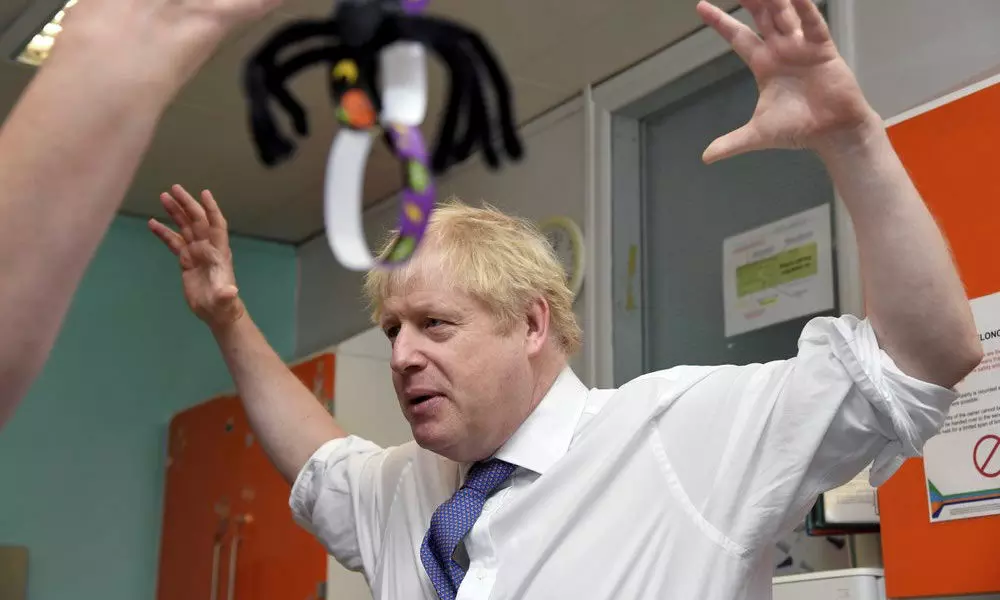Live
- Public outrage in Jharkhand's Giridih over murder, police station gheraoed
- Santosh Trophy: Meghalaya edge Goa 1-0 to secure QF berth
- Army's swift action prevented Kolkata fire from spreading: Defence Ministry
- State Police tried to murder Ravi- Union minister
- FDI flow into India from Gulf countries surges to $24.54 bn in 12 years
- BBL: McSweeney hits fiery 78 to guide Heat to thrilling win after Australia snub
- 'Exceptional case..': Delhi HC orders revision of CLAT-2025 results
- South Korea reports new avian influenza case at regional farm
- US egg prices soar to yearly high amid bird flu, holiday demand
- Ayushman Bharat proving to be boon for people in Gujarat's Kheda
Just In
EU grants Brexit delay to Jan. 31; UK ponders new election


The European Union agreed Monday to delay Brexit until Jan. 31 next year — making the concession just three days before Britain was due to become the first country ever to leave the 28-nation bloc.
BRUSSELS: The European Union agreed Monday to delay Brexit until Jan. 31 next year — making the concession just three days before Britain was due to become the first country ever to leave the 28-nation bloc.
After a very short meeting of diplomats in Brussels, European Council President Donald Tusk said on Twitter that the EU's 27 other countries will accept "the UK's request for a Brexit flex tension until 31 January 2020."
In London, Prime Minister Boris Johnson's spokesman said it was Parliament's fault, not Johnson's, that another Brexit delay was needed.
Johnson secured "a great new deal, he set out a timetable that would have allowed the U.K. to leave on Oct. 31 with that deal — and Parliament blocked it," said spokesman James Slack.
Johnson now plans to seek an early general election with the goal of getting a Parliament that would back his Brexit plan, but he may not have enough support. Lawmakers were meeting later Monday in the House of Commons on Johnson's early election call.
Tusk added that the EU decision is expected to be formalized through a written procedure, meaning a special summit of EU leaders won't likely be necessary to approve the move.
Two diplomats told The Associated Press the term "flextension" means that the U.K. will be able to leave even earlier than Jan. 31 if the Brexit divorce deal that the EU and British Prime Minister Boris Johnson agreed upon earlier this month is ratified before Jan. 31. If that happens, the U.K. will leave the EU on the first day of the month following the ratification.
Speaking anonymously because details of the decision have yet to be made public, one diplomat added that the Brexit withdrawal agreement can't be renegotiated during the extension period.
Under a law passed by British parliamentarians that forced Johnson to request the extension — which he did not want — Johnson must notify Tusk that Britain agrees to the proposed delay.
Johnson had previously said he would "rather be dead in a ditch" than agree to extend Brexit beyond Oct. 31. He has been hammering his "Get Brexit Done" mantra since he replaced Theresa May this summer, and his apparent willingness to consider leaving the bloc without a Brexit deal has spooked many British lawmakers.
Economists say a no-deal Brexit would hurt the economies of both Britain and the EU.
Tusk's announcement came after the EU diplomats met to sign off on the Brexit new delay. EU Brexit negotiator Michel Barnier told reporters "it was a very short and efficient and constructive meeting and I am happy the decision has been taken."
It's the second time the Brexit deadline has been changed since British voters in 2016 referendum decided to leave the bloc.
In London later Monday, British politicians are voting on whether to hold an early election to try to break the country's deadlock over Brexit. Johnson wants a Dec. 12 election, but looks unlikely to get the required support from two-thirds of lawmakers.
In a tactical chess move, two opposition parties — the Liberal Democrats and the Scottish National Party — plan to push for a Dec. 9 election if Johnson's proposal fails.
The ruling Conservatives desperately want a new election to bolster their numbers in Parliament. They face resistance from the main opposition Labour Party, however, which fears it could lose scores of seats in the election and is wary about having the country unwittingly tricked into crashing out of the EU without a deal.
The Dec. 9 election proposal is an effort to force Johnson to delay debate in Parliament on his Brexit withdrawal bill until after any election, depriving him of a possible victory on his trademark issue. It makes Johnson's government choose between holding an election to improve its position in Parliament and its goal of securing Brexit before that election takes place.
France was initially reluctant to extend the Brexit deadline beyond its scheduled date of Oct. 31, but French European Affairs minister Amelie de Montchalin said the perspective of a new election in Britain justifies a new delay.
She said the important thing now is that "the British and the Europeans understand that, if there are some more weeks or months, it's not to postpone difficult decisions but to put ourselves in a position to clarify the situation."
Montchalin also suggested that Britain can also still backpedal on its decision to leave the bloc by revoking Article 50 of the EU treaty and canceling Brexit.
"The prime minister can pick up his phone and call Brussels to say: I stop everything," she said.
___
Lorne Cook in Brussels and Jill Lawless, Gregory Katz and Danica Kirka in London contributed to this report.

© 2024 Hyderabad Media House Limited/The Hans India. All rights reserved. Powered by hocalwire.com






